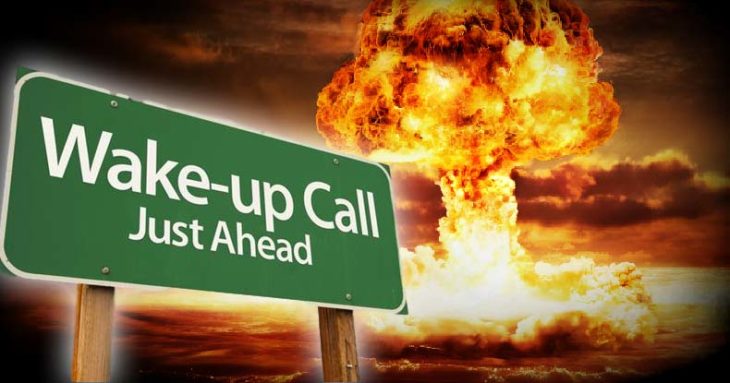Princeton Historian Warns World War III is Now A ‘Serious Threat’
By
Posted on
One of the most qualified historians in
the world today, just said the possibility of World War III is now a
serious threat — time to listen.

James is not alone in his feelings either. Last month, the Bulletin of the Atomic Scientists moved the hand of their ‘Doomsday Clock’ to just two and a half minutes to midnight. The Science and Security Board warned: “The probability of global catastrophe is very high, and the actions needed to reduce the risks of disaster must be taken very soon.”
However, governments around the world seemingly couldn’t care less about the prospect of global catastrophe or world war. The United States, at least the portion powered by the military industrial complex, seems to love the idea.
“I think [a world war] is absolutely a serious threat,” he said in an interview with Sky News.
As the Free Thought Project pointed out, both China and Russia are reacting to constant provocation from the West. Earlier this month, responding to US posturing, Beijing surreptitiously revealed a highly accurate ballistic missile system with a range long enough to directly threaten Taiwan, the hotly disputed South China Sea, the Philippines, and Japanese and U.S. military bases in Asia — including Okinawa — with a nuclear first strike.
Amazingly enough, Russia has remained calm in spite of the fact
that thousands of NATO troops, including US soldiers, continue to amass
on their border — an ostensible ‘peacekeeping’ mission.
Even though he has remained calm, President Vladimir Putin has not
taken these putative defensive measures, including the installation of
anti-missile systems, as anything less than a direct threat — and has
repeatedly warned the amassing military presence provides ample
justification for a first strike against the Western Alliance.
While responding to the commentators who compared the toxic
environment of the 1930s with that of today, James said, “They are very
scary comparisons, but I think it is a fair comparison and you can see
something that is analogous to the story of the 1920s and the 1930s.James then went on to implicate the two-party system and its constant push for conflict. As the Free Thought Project continually points out, the Left is for war, if with big government and the Right is for big government, if with war.
“That is the parties in the political middle and the center are on the whole in favor of openness, in favor of trade and in favor of migration, but they’re squeezed from both the right and the left…”
Professor James, like Ron Paul, believes that Global and open trade is key to maintaining peace, while economic protectionism, like what Donald Trump is doing, is dangerous.
“Not only does protectionism make everyone poorer—except certain special interests—but it also increases international tensions, and can lead to war,” Ron Paul points out.
As James points out, this sharp swing away from open markets, borders and trade, toward protectionism, are the same factors that led us into the last two World Wars.
While James mentions ‘globalization’ as a factor in maintaining peace, his is not referring to some massive centralized government, but rather open trade among nations and the freedom of people to travel.
And, these numbers are increasing almost daily.
James also went on to allude to the information war which is taking place in the media as well as the state and the role it plays in stoking tensions.
“In that sense, I think the aftermath of 1907 is as interesting as the 1930s.
“Because after 1907 the foreign ministries, defense ministries, intelligence agencies started to operationalize information – to think that information was essential to the control of military events – and there was a kind of arms race in terms of communications control.
“And we’re seeing that kind of arms race at the moment I think.”
“The story of unconventional warfare, with the role of Google or the role of Apple…those all feed into the debate whether communications can be controlled in the interest of national security,” he said.
Evidence of this information and propaganda war is everywhere as all sides of the political spectrum are now constantly caught in perpetuating falsehoods — creating an environment in which ‘truth’ is but a fleeting memory.
Unfortunately, no one with any political influence seems to notice this shift, and the proverbial stampede of lemmings appear to be hellbent on hurling themselves off the cliff.
No comments:
Post a Comment